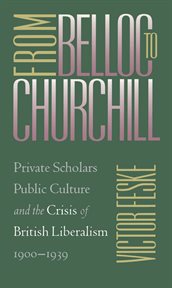Nonfiction
eBook
Details
PUBLISHED
DESCRIPTION
1 online resource
ISBN/ISSN
LANGUAGE
NOTES
Linking historiography and political history, Victor Feske addresses the changing role of national histories written in early twentieth-century Britain by amateur scholars Hilaire Belloc, Sidney and Beatrice Webb, J. L. and Barbara Hammond, G. M. Trevelyan, and Winston Churchill. These writers recast the nineteenth-century interpretation of British history at a time when both the nature of historical writing and the fortunes of Liberalism had begun to change. Before 1900, amateur historians writing for a wide public readership portrayed British history as a grand story of progress achieved through constitutional development. This 'Whig' interpretation had become the cornerstone of Liberal party politics. But the decline of Liberalism as a political force after the turn of the century, coupled with the rise of professional history written by academics and based on archival research, inspired change among a new generation of Liberal historians. The result was a refashioned Whig historiography, stripped of overt connections to contemporary political Liberalism, that attempted to preserve the general outlines of the traditional Whiggist narrative within the context of a broad history of consensus. This new formulation, says Feske, was more suited to the intellectual and political climate of the twentieth century.Originally published in 1996.A UNC Press Enduring Edition -- UNC Press Enduring Editions use the latest in digital technology to make available again books from our distinguished backlist that were previously out of print. These editions are published unaltered from the original, and are presented in affordable paperback formats, bringing readers both historical and cultural value
Mode of access: World Wide Web







